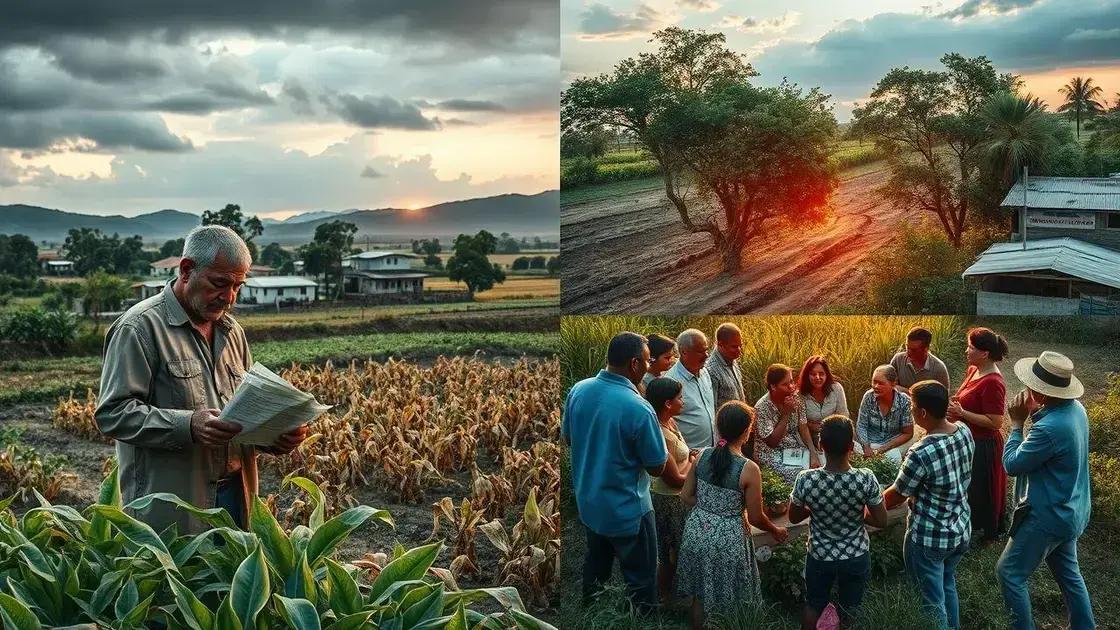Sustainable agriculture practices US: A growing trend

Anúncios
Sustainable agriculture practices enhance crop yields and soil health while reducing environmental impact, despite challenges such as initial costs and market access difficulties faced by farmers.
Sustainable agriculture practices US are gaining momentum as farmers and consumers alike seek environmentally friendly solutions. Have you considered how these practices might benefit your own community?
Anúncios
Understanding sustainable agriculture practices
Understanding sustainable agriculture practices is crucial for the future of farming. These practices are designed to meet current food needs without compromising the health of the environment and future generations. As more people become aware of climate change and resource depletion, the demand for sustainable methods continues to grow.
Many farmers are now adopting these practices, realizing the benefits they offer. By focusing on environmental health, economic profitability, and social equity, sustainable agriculture can create a resilient food system.
Anúncios
Key Principles of Sustainable Agriculture
Sustainable agriculture is based on several core principles:
- Resource conservation: Efficient use of resources, including water and soil, is essential.
- Biodiversity: Encouraging diverse crops and livestock can lead to a more stable ecosystem.
- Natural pest management: Reducing chemical inputs helps protect the environment and human health.
- Soil health: Practices like crop rotation and cover cropping enhance soil fertility and structure.
Another important aspect of sustainable agriculture practices is community involvement. Farmers work closely with local organizations and consumers to promote healthy food systems. This collaboration enables them to share knowledge and resources, ensuring that everyone benefits from sustainable food production.
Adopting sustainable methods isn’t just good for the planet; it can also be profitable for farmers. Many consumers are willing to pay a premium for foods that are grown sustainably. This market demand encourages more farmers to implement eco-friendly practices. When farmers invest in sustainable agriculture, they can expect to see both environmental and economic gains.
As we discuss the evolution of farming, it’s clear that understanding sustainable agriculture practices is vital. These practices support the long-term viability of our food systems and contribute positively to the environment, making them essential for our future.
Benefits of sustainable agriculture for farmers

The benefits of sustainable agriculture for farmers are numerous and impactful. By adopting these practices, farmers can improve not only their land but also their overall quality of life. Sustainable farming is designed to make agricultural systems more resilient and productive.
Implementing sustainable methods means farmers can reduce their reliance on chemical inputs. This shift often leads to healthier soils and crops, resulting in better yields. Farmers who use fewer chemicals benefit from a decline in input costs and reduced exposure to harmful substances.
Key Advantages of Sustainable Agriculture
Farmers who practice sustainability often find several key advantages:
- Financial savings: Reduced input costs from less reliance on fertilizers and pesticides can improve profits.
- Market opportunities: Many consumers are seeking organic and sustainably grown products.
- Improved soil health: Sustainable practices enhance soil fertility and structure, which supports better crop growth.
- Resilience to climate change: Diverse practices help farms adapt to changing environmental conditions.
In addition to financial benefits, sustainable agriculture fosters a sense of community. Farmers who engage with others in sustainable initiatives often find support networks that provide valuable information and resources. This community engagement helps to promote awareness of farming challenges and sustainable solutions.
Moreover, sustainable agriculture enhances biodiversity on farms. By rotating crops and including cover crops, farmers encourage a variety of plant and animal life. This biodiversity can naturally manage pests, leading to healthier ecosystems and improved resilience against disease.
As farmers continue to see the advantages of sustainable agriculture, more are likely to incorporate these practices into their operations. The benefits extend beyond the field, affecting local economies and communities, ultimately contributing to a healthier planet.
Techniques for implementing sustainable farming
Implementing sustainable farming techniques can revolutionize the agricultural landscape. Farmers can adopt various practices to improve productivity while ensuring environmental health. These techniques focus on efficient resource use and minimizing negative impacts.
Crop rotation is one effective method. By rotating different crops, farmers can enhance soil fertility, control pests, and reduce disease. This technique not only keeps the soil healthy but also maximizes land use. Farmers should consider integrating legumes, which naturally enrich the soil with nitrogen.
Incorporating Conservation Practices
Another technique is conservation tillage. This method reduces soil disturbance, helping to maintain soil structure and organic matter. Less tillage also minimizes erosion and preserves moisture in the soil. Here are some effective conservation practices:
- No-till farming: Leaving crop residues on the field protects the soil.
- Cover cropping: Planting cover crops improves soil health and prevents erosion.
- Buffer zones: Establishing vegetated areas between fields and water sources helps filter runoff.
- Crop diversity: Growing a variety of crops can reduce the risk of pest issues.
Another key element of sustainable farming is the use of integrated pest management (IPM). This approach combines biological, cultural, and chemical tools to manage pests. By focusing on prevention, farmers can reduce reliance on harmful pesticides while effectively controlling pest populations.
Water management is also crucial. Implementing practices such as drip irrigation helps conserve water and improves efficiency. This technique ensures that water reaches plant roots directly, reducing waste and promoting healthier plants. Rainwater harvesting systems can also be beneficial, allowing farmers to capture and use rain for irrigation.
By using these sustainable farming techniques, farmers can create a more resilient agricultural system. These practices lead to healthier crops, improved soil, and a better environment for future generations. The shift towards sustainability is not only beneficial for the land but also for the farmers and the communities they serve.
Challenges faced in sustainable agriculture

Despite the many benefits of sustainable agriculture, farmers often face several challenges when implementing these practices. Understanding these difficulties can help in finding solutions and promoting a successful transition to sustainable methods.
One major challenge is the initial cost of switching to sustainable practices. Many farmers need to invest in new equipment, seeds, or technologies that support sustainability. This upfront cost can be a barrier, especially for small-scale farmers with limited budgets. However, the long-term savings and environmental benefits can outweigh these initial expenses.
Market Access and Competition
Another issue involves market access. Farmers practicing sustainable agriculture may find it difficult to meet consumer demands or access markets that value organic or sustainably produced goods. Competing with large-scale industrial farms can also be challenging. These farms often benefit from economies of scale that allow them to produce food at lower costs.
- Consumer education: Raising awareness about the benefits of sustainably sourced products is crucial for creating demand.
- Certification processes: Obtaining organic certification can be time-consuming and costly, deterring some farmers.
- Supply chain issues: Establishing reliable sourcing and distribution channels for sustainable goods can be complex.
- Policy support: Lack of government incentives for sustainable practices can hinder progress.
In addition to economic barriers, farmers also encounter environmental challenges. Climate change can introduce new pests and diseases, affecting crop yields and farm viability. Extreme weather events, like droughts or floods, pose significant risks to sustainable farming practices. Adapting to these environmental changes requires knowledge, resources, and often additional investment.
Moreover, transitioning to sustainable practices can lead to resistance within farming communities. Some farmers may be set in their traditional methods and skeptical about the effectiveness of new, sustainable techniques. Establishing a community of support and sharing success stories can help overcome this skepticism and encourage a wider adoption of sustainable practices.
While the challenges faced in sustainable agriculture are significant, they are not insurmountable. By addressing these issues through education, support, and community engagement, it is possible to create a more sustainable and resilient agricultural system.
FAQ – Frequently Asked Questions about Sustainable Agriculture
What are the main benefits of sustainable agriculture for farmers?
Sustainable agriculture improves soil health, reduces costs, and opens up new market opportunities for farmers.
What challenges do farmers face when transitioning to sustainable practices?
Farmers may encounter high initial costs, market access issues, and climate-related challenges.
What techniques are commonly used in sustainable agriculture?
Common techniques include crop rotation, conservation tillage, and integrated pest management.
How can community support enhance sustainable farming efforts?
Community support provides farmers with resources, knowledge, and motivation to adopt sustainable practices.





